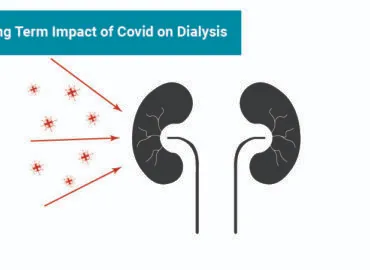The long term impact of Covid-19 on diabetes management, with a specific emphasis on dialysis
- 2020 is wrapping up soon, but the virus is still around, making everyone wonder what the world is going to be like 5 years, 10 years or 20 years from now.
- COVID-19 has brought some core issues to the forefront for everyone to think about, consciously – primarily Health, Money and Lifestyle habits. It has made people question what they’re doing about it now, and what they intend to do in the long term. It has made each one ask themselves – “How prepared are we?”
- Good health is like gold in the bank. If you hold on to it, you are safe; if you lose it, you can never get it back at the same rate that you originally got it. In this lockdown scenario, the worst affected have been the elderly and those with persistent ailments like heart issues, diabetes or those on dialysis.
- Diabetes is not a sudden development, but rather, something that silently builds up over time, either due to one’s genetics or one’s lifestyle. What many people are not aware of, is the long term impact that it has on other organs, and how it can be detrimental to one’s health. It is only natural that during a pandemic, such people will also be at a greater risk of picking up infections. What is a huge cause for worry is that research shows that diabetics are at a much higher risk for severe clinical outcomes of COVID-19. This is because Hyperglycaemia can impair host defences, and poor glycaemic control has been associated with infections.
Like diabetics, patients on dialysis are also at a much higher risk, if they contract the virus.
“People with kidney failure on dialysis are immunocompromised. Hence they are a high risk group for the complications of COVID-19.” -Dr. Prashant C Dheerendra, Consultant Nephrologist, Apollo Dialysis Clinics
- The lockdown has been a particularly challenging time for kidney patients who need to go to a clinic or hospital for their dialysis procedure at least twice a week. It is not advisable for a dialysis patient to skip or postpone the procedure, as it can lead to complications. But, with the fear prevalent everywhere, patients have been hesitating and uncertain how to manage their health.
- Multispeciality hospitals who have had to attend to Covid patients as well, have gone out of their way to create Covid-free zones within the premises, and ensure that the rate of infection transfer is near-zero. This has been made possible due to the strict diligence in adhering to Government of India guidelines, and maintaining high levels of sanitisation and hygiene. Which means, all areas and surfaces are sanitised at regular intervals, medical waste is disposed off with extra precaution and the doctors, nurses, technicians and administrative staff are also monitored strictly. Extra guidelines have been given additionally to dialysis patients, to help them go through their bi-weekly procedure with minimal risks.
- Is this the way it is going to be in the coming few years? Yes, with some changes, depending on how the current situation resolves itself. Going forwards, all hospitals and clinics will have to follow these stringent norms for the sake of patient care, and one may see a rise in more speciality dialysis clinics.
Home Hemodialysis is another option that will soon be available to patients who can afford the same. Like in other countries, especially New Zealand and Australia, patients will be able to have a dedicated set up at home, and can opt to have the procedure at their convenience, within the safety and comfort of home and without having to travel twice or more every week to a clinic or hospitals. The Apollo Dialysis Clinics will soon be launching a pilot project in Bangalore, and once it is successful will take their Home Hemo Dialysis expertise to other cities.
“Home dialysis, logically speaking, should decrease the risk of contracting COVID-19 as exposure to potential carriers is cut down significantly.” -Dr. Prashant C Dheerendra, Consultant Nephrologist, Apollo Dialysis Clinics
- While the possibilities and outcomes are endless, now is a good time for people to start putting their health as priority, irrespective of whether or not they have any medical issues.
- Experts recommend consistently bringing about changes in one’s food and lifestyle, to actually live a healthy and close-to-normal life. Simply put, it means cutting down on restricted foods, eating in smaller portions, committing to a routine of exercises, yoga, pranayama and taking brisk walks. Having a regular health check is also recommended so that red flags are caught in time, and further damage is prevented or reversed.
- When we look back at 2020, we should remember it as the year we took charge and responsibility for our own health and wellbeing.
Author is a Nephrologist of Apollo Dialysis Clinics. Currently Apollo Dialysis Clinics operates 70+ clinics at 60+ locations in Delhi-NCR (Gurgaon), Telengana, Andhra Pradesh, Assam, Bihar, Karnataka and Tamil Nadu. The company has also recently launched Home Dialysis Services in Bangalore, Chennai, Hyderabad, Delhi, Guwahati.

